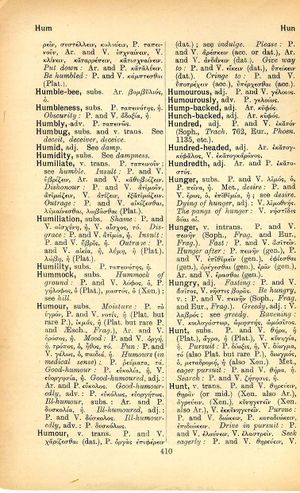humour: Difference between revisions
Μακάριος, ὅστις ἔτυχε γενναίου φίλου → Generosa amicus mente , felicis bonum → Glückselig ist, wer einen edlen Freund gewinnt
mNo edit summary |
m (Woodhouse1 replacement) |
||
| Line 1: | Line 1: | ||
{{Woodhouse1 | {{Woodhouse1 | ||
|Text=[[File:woodhouse_410.jpg|thumb|link={{filepath:woodhouse_410.jpg}}]] | |Text=[[File:woodhouse_410.jpg|thumb|link={{filepath:woodhouse_410.jpg}}]] | ||
===substantive=== | |||
[[moisture]]: P. τὸ ὑγρόν, P. and V. [[νοτίς]], ἡ ( | [[moisture]]: [[prose|P.]] [[τὸ ὑγρόν]], [[prose|P.]] and [[verse|V.]] [[νοτίς]], ἡ ([[Plato]] but rare [[prose|P.]]), [[ἰκμάς]], ἡ ([[Plato]] but rare [[prose|P.]] and [[Aeschylus|Aesch.]], ''Fragment''), [[Aristophanes|Ar.]] and [[verse|V.]] [[δρόσος]], ἡ. | ||
[[mood]]: P. and V. [[ὀργή]], ἡ, [[τρόπος]], ὁ, [[ἦθος]], τό. | [[mood]]: [[prose|P.]] and [[verse|V.]] [[ὀργή]], ἡ, [[τρόπος]], ὁ, [[ἦθος]], τό. | ||
[[fun]]: P. and V. [[γέλως]], ὁ, [[παιδιά]], ἡ. | [[fun]]: [[prose|P.]] and [[verse|V.]] [[γέλως]], ὁ, [[παιδιά]], ἡ. | ||
[[humours]] ([[ | [[humours]] (in [[medical]] [[sense]]): [[prose|P.]] [[ῥεύματα]], τά. | ||
[[good-humour]]: P. [[εὐκολία]], ἡ, V. [[εὐοργησία]], ἡ. | [[good-humour]]: [[prose|P.]] [[εὐκολία]], ἡ, [[verse|V.]] [[εὐοργησία]], ἡ. | ||
[[good-humoured]], adj.: Ar. and P. [[εὔκολος]]. | [[good-humoured]], adj.: [[Aristophanes|Ar.]] and [[prose|P.]] [[εὔκολος]]. | ||
[[good-humouredly]], adv.: P. εὐκόλως, εὐοργήτως. | [[good-humouredly]], adv.: [[prose|P.]] [[εὐκόλως]], [[εὐοργήτως]]. | ||
[[ill-humour]], | [[ill-humour]], '''substantive''': [[Aristophanes|Ar.]] and [[prose|P.]] [[δυσκολία]], ἡ. | ||
[[ill-humoured]], adj.: P. and V. [[δύσκολος]]. | [[ill-humoured]], adj.: [[prose|P.]] and [[verse|V.]] [[δύσκολος]]. | ||
[[ill-humouredly]], adv.: P. δυσκόλως. | [[ill-humouredly]], adv.: [[prose|P.]] [[δυσκόλως]]. | ||
===verb transitive=== | |||
P. and V. χαρίζεσθαι (dat.), P. ὀργὰς ἐπιφέρειν (dat.); see [[indulge]]. | [[prose|P.]] and [[verse|V.]] [[χαρίζεσθαι]]; (dat.), [[prose|P.]] [[ὀργὰς ἐπιφέρειν]] (dat.); see [[indulge]]. | ||
[[please]]: P. and V. ἀρέσκειν (acc. or dat.), Ar. and V. ἁνδάνειν ([[dat]]). | [[please]]: [[prose|P.]] and [[verse|V.]] [[ἀρέσκειν]]; (acc. or dat.), [[Aristophanes|Ar.]] and [[verse|V.]] [[ἁνδάνειν]]; ([[dat]]). | ||
[[give way to]]: P. and V. εἴκειν (dat.), ὑπείκειν (dat.). | [[give way to]]: [[prose|P.]] and [[verse|V.]] [[εἴκειν]]; (dat.), [[ὑπείκειν]] (dat.). | ||
[[cringe to]]: P. and V. ὑποτρέχειν (acc.), ὑπέρχεσθαι (acc.). | [[cringe to]]: [[prose|P.]] and [[verse|V.]] [[ὑποτρέχειν]]; (acc.), [[ὑπέρχεσθαι]] (acc.). | ||
}} | }} | ||
Revision as of 09:15, 20 May 2020
English > Greek (Woodhouse)
substantive
moisture: P. τὸ ὑγρόν, P. and V. νοτίς, ἡ (Plato but rare P.), ἰκμάς, ἡ (Plato but rare P. and Aesch., Fragment), Ar. and V. δρόσος, ἡ.
mood: P. and V. ὀργή, ἡ, τρόπος, ὁ, ἦθος, τό.
fun: P. and V. γέλως, ὁ, παιδιά, ἡ.
humours (in medical sense): P. ῥεύματα, τά.
good-humour: P. εὐκολία, ἡ, V. εὐοργησία, ἡ.
good-humoured, adj.: Ar. and P. εὔκολος.
good-humouredly, adv.: P. εὐκόλως, εὐοργήτως.
ill-humour, substantive: Ar. and P. δυσκολία, ἡ.
ill-humoured, adj.: P. and V. δύσκολος.
ill-humouredly, adv.: P. δυσκόλως.
verb transitive
P. and V. χαρίζεσθαι; (dat.), P. ὀργὰς ἐπιφέρειν (dat.); see indulge.
please: P. and V. ἀρέσκειν; (acc. or dat.), Ar. and V. ἁνδάνειν; (dat).
give way to: P. and V. εἴκειν; (dat.), ὑπείκειν (dat.).
cringe to: P. and V. ὑποτρέχειν; (acc.), ὑπέρχεσθαι (acc.).

